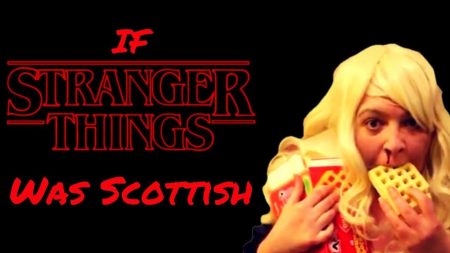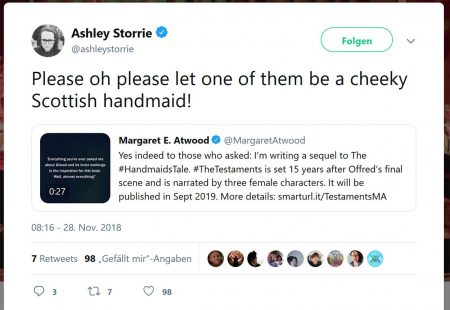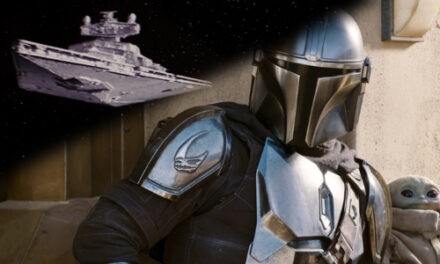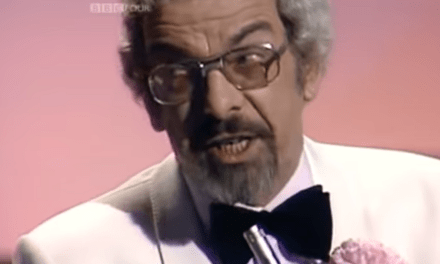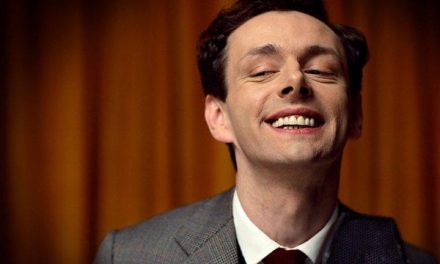‘Alright, it’s me Joyce Byers fae Stranger Things. Everybody calls me big Jo-B.’
Imagine a different world, a world were stuff was Scottish… Harry Potter, Game of Thrones, Stranger Things, Gwyneth Paltrow, The Handmaid’s Tale—all Scottish. The good news is, you don’t have to imagine this because Ashley Storrie has already done it for you, in a handy set of refreshingly foul-mouthed short videos.
Googling Storrie tends to bring up references to her viral videos. In a 2018 interview for stand-up website Beyond the Joke, Storrie relates how slow this success actually was in coming.
“How important is luck in terms of career success – have you had lucky breaks?
Luck is certainly a factor. I made a YouTube video called ‘If Harry Potter was Scottish’ and it languished on that platform for two years with maybe 300 hits… then when Facebook started to become a more active video platform we moved it, it got shared a bit more and then LadBible asked to buy it…. The original video now has 25 million views, and when it was posted again a year later it got another 3 million in a day.”
A regular stand-up comedian and compere, Storrie’s ‘performance’ in the videos varies, depending on what or who she is parodying. Sometimes she speaks with a Scottish accent, sometimes she doesn’t. Janey Godley and Storrie’s take on Made in Chelsea cracks me up because the affected drawls disintegrate into laughter when Godley’s accent very quickly starts slipping. Obviously, the ‘if stuff were Scottish’ videos work because of the accent, as well as the typically Glaswegian perspective and humour. (The Made in Chelsea parody ends with ‘Made in Calton’. Instead of several minutes of, like, soul-searching the daughter says ‘I can’t come over for Christmas’ and the mother replies, ‘Fuck you, bye’). Filmed on a mobile phone by an anonymous person (possibly her mother, fellow female comedian, Janey Godley) Storrie’s videos tap into the ‘amateur’ aesthetic of mockumentary and actual user-generated content, not the polished YouTube celebrity or reality TV ‘star’. In fact, she ends her Ashley Reacts to Love Island video with a caustic call to ‘gie that [prize] money tae a nurse, gie it tae a teacher cuz they deserve it’ rather than contestants who win ‘50 grand for letting themselves be fingered on telly’.
The premise of ‘If stuff was Scottish’ challenges the dominance of US (and English) media, or at least challenges popular perspectives of what such media mean and how audiences might respond to them. Storrie’s parodies are informed by her awareness of regionality, her pride in Scotland’s cultural distinctiveness, the shared experience of living in a supposedly ‘united’ country where central government and mainstream culture does not value—sometimes does not even acknowledge—its outlying regions. Storrie is, by her own admission, a fangirl and the targets of her parodies are not necessarily things she dislikes or disagrees with. During the Stranger Things video, for instance, jump cut editing interlaces surreal grimaces with ordinary, direct-to-camera talk, albeit about Joyce’s son being ‘a lamp’. Only someone quite familiar with the series would offer this knowing visual parody, and the video is self-described as posted ‘to celebrate the release of Stranger Things series 2.’ It is the translation of such global media successes into everyday Scottishness that estranges them and creates much needed laughter. It’s like entering the Upside Down, but in a good way, ken.
‘If stuff were Scottish’ also challenges the typical representations of Scotland and Scottishness that prevail in popular film and TV.
This year, Netflix original feature Outlaw King directed by David Mackenzie and Josie Rourke’s Mary Queen of Scots film (released in US cinemas in December 2018 and in the UK during January 2019) have both come in for criticism for the liberties they take with Scottish history. At least two of Storrie’s subjects, Game of Thrones and Harry Potter, have employed British actors and filmed at locations in Scotland, among many other countries, bringing a degree of employment and a large amount of tourist traffic into the country, yet neither announce themselves as Scottish, and both occupy fantasy realms tinged with nostalgia and outright myth. The kind of Scottishness that exports well tends to be (a)historical, twee and—of course—tartan, as well as starring American actors, or Irish, if greater authenticity is required. All this is a far cry from the lives of contemporary Scots, rural or urban, something Storrie, thankfully, often reminds us of. In If Harry Potter was Scottish, #TanyaPotter points to her lightning bolt scar that ‘tingles when the Dark Lord riseth’, only to interrupt herself with a brief aside: ‘by dark lord I jist mean this guy down the street that sells smack.’
Given that Storrie’s grandfather was an east end Glasgow ‘criminal’ and her parents ran a pub in the Calton while sending her to private (fee-paying) school to have a better education than they had the opportunity for, she certainly has experience of how social class operates in Scotland and how many communities live side by side with criminal or anti-social behaviour. Her work generally subverts norms of class, language, gender. She tends to take a feminist approach: a video called If periods were people has many laugh-out-loud moments,
 another is titled, with tongue-in-cheek, Top Tips for a Single Lady on Valentine’s Day and one of her stand-up routines mentioned the importance of regular cervical smears. #TanyaPotter is ‘a witch stroke wizard—I don’t really like gender-appropriate magical terms,’ she explains.
another is titled, with tongue-in-cheek, Top Tips for a Single Lady on Valentine’s Day and one of her stand-up routines mentioned the importance of regular cervical smears. #TanyaPotter is ‘a witch stroke wizard—I don’t really like gender-appropriate magical terms,’ she explains.
Despite the Scottishness of her videos, appealing to me as someone born and raised in Scotland who has lived in England for decades, Storrie’s comedy clearly has broad appeal. When asked ‘What has surprised you the most during your career in comedy?’ she replies
“How much we all have in common. It’s easy to see all of our differences right now, but I think comedy can be very unifying. I told a story about my dad during the Fringe, and after one show a posh Scottish girl, a Nigerian boy and a big hulking man with a neck tattoo from Birmingham all came to me to tell me their dad was just like mine. I knew there’d be things we all disagreed on, but we all had a dad who was weird and we celebrated that shared thing.”
In times when ‘it’s easy to see all of our differences,’ unifying comedy is a gift. The same week I wrote this blog, I taught an MA session on The Handmaid’s Tale television series. Since most of the students study part time, the class runs 6-9pm. I thought long and hard about how to end the session: three hours of the unremitting grimness of an anti-feminist, misogynist dystopia realised in graphic detail and full technicolour is gruelling. If The Handmaid’s Tale was Scottish was the perfect conclusion, demonstrating the global success of the Hulu series, the way it captured the current zeitgeist, but offering critical and comedic distance from its oppressive seriousness.
A few days before I taught the class, Margaret Atwood, Canadian author of The Handmaid’s Tale, announced that she is publishing a sequel to the feminist dystopian novel in 2019, to be narrated by three female characters.
Now that would be pure brilliant. Over to you, OffBread.
Lorna Jowett is a Reader in Television Studies at the University of Northampton and coordinator of the Cult TV: TV Cultures Network. She is the author of Dancing With the Doctor: Dimensions of Gender in the Doctor Who Universe (2017), Sex and the Slayer: A Gender Studies Primer for the Buffy Fan (2005), co-author with Stacey Abbott of TV Horror: Investigating The Dark Side of the Small Screen (2013), and co-editor of Time on TV. She has published many articles on television, film and popular culture, and her next book, co-edited with Kristopher Woofter, examines horror and the work of Joss Whedon.


